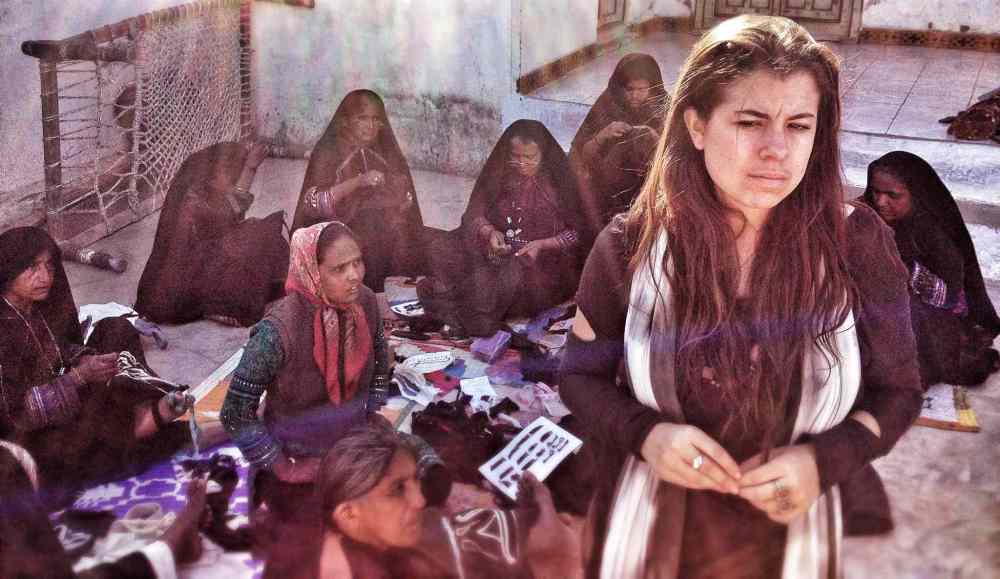Ethical by design
Is it better to look good than to feel good? Documentary says there doesn't need to be a choice
Advertisement
Read this article for free:
or
Already have an account? Log in here »
To continue reading, please subscribe:
Monthly Digital Subscription
$1 per week for 24 weeks*
- Enjoy unlimited reading on winnipegfreepress.com
- Read the E-Edition, our digital replica newspaper
- Access News Break, our award-winning app
- Play interactive puzzles
*Billed as $4.00 plus GST every four weeks. After 24 weeks, price increases to the regular rate of $19.00 plus GST every four weeks. Offer available to new and qualified returning subscribers only. Cancel any time.
Monthly Digital Subscription
$4.75/week*
- Enjoy unlimited reading on winnipegfreepress.com
- Read the E-Edition, our digital replica newspaper
- Access News Break, our award-winning app
- Play interactive puzzles
*Billed as $19 plus GST every four weeks. Cancel any time.
To continue reading, please subscribe:
Add Winnipeg Free Press access to your Brandon Sun subscription for only
$1 for the first 4 weeks*
*$1 will be added to your next bill. After your 4 weeks access is complete your rate will increase by $0.00 a X percent off the regular rate.
Read unlimited articles for free today:
or
Already have an account? Log in here »
Hey there, time traveller!
This article was published 23/04/2015 (3813 days ago), so information in it may no longer be current.
It’s the most popular and painfully over-posed question on pop-culture pedestrian parade routes:
“Who are you wearing?”
But it’s never followed up with more conscience-challenging queries such as, “Why are you wearing it?” or “Where did it really come from?”

Those are the questions raised in Traceable, a new style-focused documentary that challenges the public’s obsession with fashion and branding and the never-ending “need” to own and wear what’s trendy and new.
The film, written and directed by Jennifer Sharpe, is being given a multiplex-style première this Friday at 7 p.m. on Bell Media-owned Bravo, MTV, M3 and E!. The timing is apt, given that it airs on the second anniversary of the Rana Plaza factory collapse in Savar, Bangladesh, which killed 1,129 garment-industry workers and injured nearly 2,500 more.
Traceable focuses mostly on the U.S. fashion industry and the designers who launch their lines during New York City’s annual fashion week, but it’s a Canadian — Toronto designer Laura Siegel — who is singled out for her efforts to create a clothing line based on ethical labour relationships and sustainable production techniques.
Despite the fact it begins to feel, at times, like an infomercial for Siegel (who is listed as an executive producer in the film’s credits) and her clothing, Traceable does raise some valid questions about the choices consumers make and the responsibility that clothing makers have in terms of knowing how and where their garments are made.
The simple truth of the matter, says Sourcemap founder and CEO Leonardo Bonanni, is that the people who run the world’s biggest clothing companies often have no real idea where fabrics are created and certain elements of assembly take place.
“Traceability is all about quality control,” he says. “You can only make sure you’re selling high-quality products if you’ve visited, or had somebody else audit, the place where it was made.”
And that’s where filmmaker Sharpe turns her attention to Siegel, a young-ish Torontonian who’s scrambling to prepare the new collection that will be unveiled in New York during fashion week. Siegel, who took a year off during her fashion-design studies and backpacked her way around Asia, now spends many weeks each year meeting with the artisans and craftspeople whose work has inspired her latest clothing creations.
The film crew follows Siegel to India, where she has forged close personal ties with her suppliers. Her emphasis is less on speed and efficiency of production and much more on the quality and individuality of each piece.
“Finding the right people to work with, that you know can produce quality work on time, is one of the most important things to me,” she says.
But doing things the right way proves to be complicated, and the last few segments of Traceable play out like an Amazing Race-style sprint to the finish line as Siegel jets back to New York just hours before her crucial unveiling is scheduled to begin.
What is presented is a small victory for a little-known emerging designer in an overcrowded and profit-obsessed industry, but Bonanni — an advocate for supply-chain transparency — says there’s a larger lesson contained in Siegel’s modest story.
“If you want to get the message across to companies that you care about transparency (and) ensuring a sustainable, equitable supply chain, you have to vote with your dollars,” he advises. “That will give the ammunition to those internal advocates within the companies to push for more sustainable supply chains.”
brad.oswald@freepress.mb.ca Twitter: @BradOswald

Our newsroom depends on a growing audience of readers to power our journalism. If you are not a paid reader, please consider becoming a subscriber.
Our newsroom depends on its audience of readers to power our journalism. Thank you for your support.
History
Updated on Thursday, April 23, 2015 9:17 AM CDT: Replaces photo

